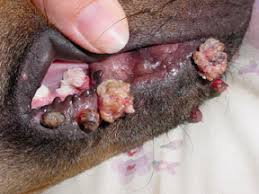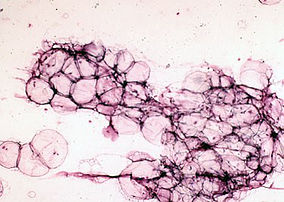There are many changes that can occur in our pets as they age. These changes may require us to care for them differently than we may have when they were younger. This guide is intended to help you recognize the signs or symptoms common in our senior pets and ways to...
Dogs
Anaplasmosis: Your Guide to This Tick-Borne Disease
Anaplasma phagocytophila (formerly Ehrlichia equi) is a tick-borne disease which causes Equine Granulocytic Ehrlichiosis. This non-contagious disease is transmitted by the deer tick or blacklegged tick called Ixodes scapularis. (In western states it is also...
Viral Papillomas
Viral papillomas in dogs are small growths on the lips, gums, around the eyes or on the toes. They are hairless growths that have the appearance of tiny clusters of fingers or fronds. These lesions are most common in young dogs. Papilloma lesions are caused by a...
Canine Allergies
What are allergies? An allergy is an abnormal reaction of the immune system. Normally, the immune system fights off foreign agents like bacteria and viruses to protect the body. In an animal with allergies, the immune system is reacting in an abnormal way to...
Conservative Management of Arthritis
Weight Control Maintaining a healthy weight may be the most important element in assuring the best possible quality of life for a dog with osteoarthritis. Body weight not only increases the load on all joints, but inflammatory proteins produced by fat cells can cause...
Lipomas in Dogs
Lipomas are very common, benign growths in dogs. They are seen less frequently in cats. These growths consist of fat cells and can range in size from very tiny to ten or more inches in diameter. The most common areas to find lipomas are under the skin in the regions...
Mast Cell Tumor
Mast cell tumors are one of the most common skin tumors in the dog. They arise from a population of inflammatory cells called mast cells. Mast cells are filled with granules of inflammatory mediators such as histamines. When manipulated these granules are released...
Canine Demodex
Overview Demodectic mange is caused by a microscopic Demodex mite. All dogs have demodex mites on their skin that live within the hair follicles. Most dogs live in harmony with their mites, never suffering any consequences from being parasitized. However, if the dog's...
Calcium Oxalate Uroliths
Why do Calcium Oxalate Uroliths form? Genetics, dietary issues and some metabolic diseases can predispose pets to the formation of calcium crystals or stones. Pets that have more acidic (low) urine pH and very concentrated urine can be factors in calcium oxalate...
Chronic Kidney Disease
General Information Chronic kidney disease refers to a condition in which the kidneys have not been performing at least one of their main tasks adequately, resulting in blood or physical abnormalities. Normal kidneys filter the blood, removing wastes and excreting...










